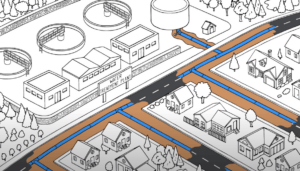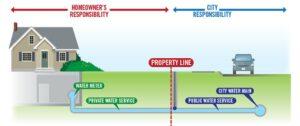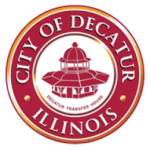Lead in Drinking Water
Lead is an element found in nature with the chemical symbol Pb. It is a soft metal used for most of the 20th century in everything from paint and gasoline to plumbing pipes and fixtures; and has been linked to a number of serious health ailments. Infants, children and developing fetuses are particularly susceptible to the effects of lead exposure because it can accumulate in the body.
This brochure and video from the American Water Works Association provides helpful, accurate information about lead in drinking water.
For many years, the City of Decatur has been working to eliminate lead from customers’ drinking water supplies. The water leaving the City’s treatment plant is consistently free of lead, as well as the water traveling through water mains. We also adjust the water’s chemistry at the treatment plant to minimize the possibility of any lead in water service lines from dissolving into the drinking water.
As a result, Decatur’s water quality reports have consistently shown acceptable levels of lead in the City’s drinking water. Nonetheless, we are actively working to do even better. The goal is to reduce or eliminate every source of lead, both from public and private sources.
In the past, a short section of lead pipe was used to connect the water service lines in older homes to the water mains. The practice of using lead connectors, called lead goosenecks, was stopped by 1940. Unfortunately, though, our records indicate that there are more than 6,000 water service lines in the City of Decatur which are downstream of lead goosenecks or once were downstream of lead goosenecks. Galvanized iron water service lines were typically installed along with lead goosenecks. Illinois State Law now requires that all of these galvanized service lines and any remaining lead goosenecks be completely replaced starting in 2027.
We are also working on plans to remove every lead gooseneck and every galvanized water service line that is or ever was downstream of a lead gooseneck.
Water Service Line Replacement Cost-Sharing Program
The Decatur City Council is aware that many residents would like to reduce all risks of lead in their drinking water as soon as possible. So, in January 2023, they adopted a cost-sharing policy for water service line replacement. If your home was built before 1940, you are encouraged to consider this program. If your home was built after 1940, you are likely not affected.
You can check your eligibility for the program by calling the Water Service Division at 217-875-5705. The team will check whether the records show that your private water service line is galvanized or not. If it is galvanized, you will be guided through the process of getting bids for the project and submitting the paperwork to be reimbursed for the City cost share.
The City is preparing a map which will allow residents to check whether their water service is suspected of containing lead. The map should be available on this page by October 2024.
What is the cost share?
The cost to replace a private water service line is typically between $2,000 and $7,000. You will need to get at least two bids from qualified plumbers. The cost-sharing program allows for up to 50 percent to be covered by the City.
- For Residential customers, the cost-sharing program can provide 50 percent of your cost, up to $3,000 maximum in City assistance.
- For Commercial customers, the cost-sharing program can provide 50 percent of your costs, up to $5,000 maximum in City assistance.
As an additional incentive, when you replace your private water service line through the cost-sharing program, the city will replace the public water service line at no cost to you. As a result, the entire water service line will be replaced from the city water main to the house, eliminating that source of lead in drinking water.
The water service line replacement cost-share program has proven to be popular, and you may be placed on a waiting list initially. We appreciate your patience, and we will attempt to get to every applicant. Protecting public health by eliminating this source of lead in drinking water is a priority for the City Council.
Long-Term Water Service Line Replacement Program
If you are not ready to participate in the City’s water service line cost-sharing program right now, rest assured that every galvanized water service line will eventually be replaced as part of a long-term program. Illinois State Law requires that the long-term replacement program start in 2027 and be completed in 17 years. The City of Decatur has prepared an initial draft of the replacement program. We have also applied for $21 million in funding from the State of Illinois to implement the program. If the funding is received, it will allow the City to start the replacement program in 2025 and accomplish much of the replacement in the first five years. We expect the State will make a decision about the City’s funding request in June or July 2024.
Do-it-yourself Steps to Reduce Lead in Drinking Water
Here are some steps you can take right now to reduce the risk of lead in drinking water:
- Replace plumbing that contains lead – We recommend you use an experienced, certified plumber to look for and replace lead fittings, fixtures or other potential sources of lead.
- Use a Filter – Several types of inexpensive household water filters are effective at removing lead. Before purchasing, look for a certification from the NSF International that verifies the filter’s ability to remove lead. It will usually be found on the packaging.
- Run the Tap Before Use – Lead levels are likely at their highest when water has been sitting in the pipe for several hours. Clear this water from your pipes by running the cold water for several minutes, which allows you to draw fresh water from the main. You can use this water on house plants or to flush toilets.
- Use Cold Water for Cooking – Always cook and prepare baby formula with cold water, because hot water dissolves lead more quickly, resulting in higher levels in water.
- Clean aerators – Aerators are small attachments at the tips of faucets which regulate the flow of water. They can accumulate small particles of lead in their screens. It’s a good idea to remove your aerators at least monthly and clean them out.
For More Information
There are a number of resources available for more information about lead, water filtration systems, and other related issues.
CDC – Lead in Drinking Water – The U.S. Centers for Disease Control and Prevention has information on lead’s health effects and tips for protection from water and other common sources of exposure.
Drinktap.org – A public service of the American Water Works Association, drinktap.org was created to provide people information about a variety of water-related issues, from water quality to conservation.
Epa.gov/lead – The federal agency responsible for the safety of America’s drinking water, the U.S. Environmental Protection Agency hosts a comprehensive website that addresses all sources of lead in the home.
Nsf.org – NSF International provides consumer information about water filter capabilities, including claims to reduce lead. The NSF can also be reached at 800-NSF-8010.
Contact Us
The following departments can provide more information on this topic:
- Public Works Engineering: 217-424-2747, Robert Weil – rweil@decaturil.gov
- Water Distribution: 217-875-5705, Randy Miller – rmiller@decaturil.gov
- Water Production: 217-424-2834, Chaundra Smith – csmith@decaturil.gov



